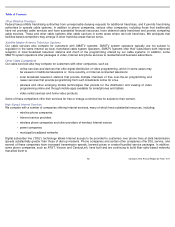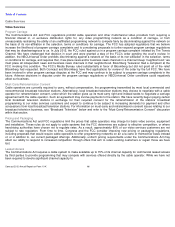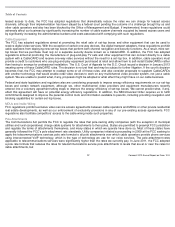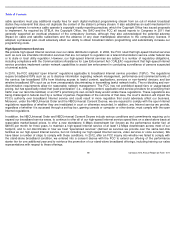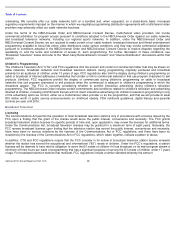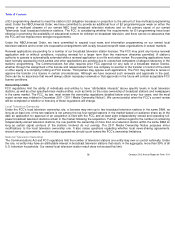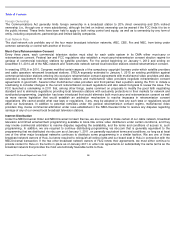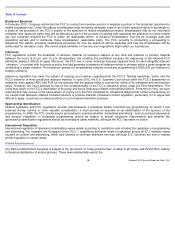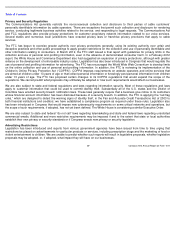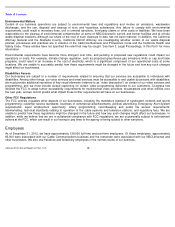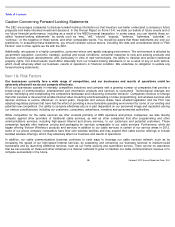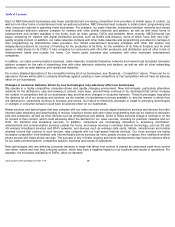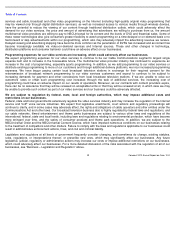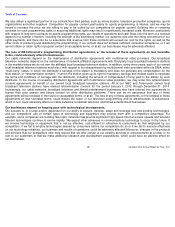Comcast 2012 Annual Report Download - page 26
Download and view the complete annual report
Please find page 26 of the 2012 Comcast annual report below. You can navigate through the pages in the report by either clicking on the pages listed below, or by using the keyword search tool below to find specific information within the annual report.
Table of Contents
of E/I programming deemed to meet the station’
s E/I obligation increases in proportion to the amount of free multicast programming
aired. Under the NBCUniversal Order, we have committed to provide an additional hour of E/I programming per week on either the
primary or multicast streams of our owned NBC local broadcast television stations and on the primary signal of our owned
Telemundo local broadcast television stations. The FCC is considering whether the requirements for E/I programming have been
effective in promoting the availability of educational content for children on broadcast television, and there can be no assurance that
the FCC will not impose more stringent requirements.
Under the NBCUniversal Order, we have committed to expand local news and information programming on our owned local
television stations and to enter into cooperative arrangements with locally focused nonprofit news organizations in certain markets.
Renewal applications are pending for a number of our broadcast television station licenses. The FCC may grant any license renewal
application with or without conditions, including renewal for a lesser term than the maximum otherwise permitted. A station’
s
authority to operate is automatically extended while a renewal application is on file and under review. Four pending applications have
been formally opposed by third parties and other applications are pending due to unresolved complaints of alleged indecency in the
stations’
programming. The Communications Act also requires prior FCC approval for any sale of a broadcast station license,
whether through the assignment of the license and related assets from one company to another or the transfer of control of the stock
or other equity of a company holding an FCC license. Third parties may oppose such applications. The FCC may decline to renew or
approve the transfer of a license in certain circumstances. Although we have received such renewals and approvals in the past,
there can be no assurance that we will always obtain necessary renewals or that approvals in the future will contain acceptable FCC
license conditions.
Ownership Limits
FCC regulations limit the ability of individuals and entities to have “attributable interests”
above specific levels in local television
stations, as well as other specified mass media entities, such as limits on the cross-
ownership of broadcast stations and newspapers
in the same market. The FCC, by law, must review the ownership regulations detailed below once every four years, and the most
recent review was initiated in December 2011 (“2011 Media Ownership Notice”). We cannot predict when the FCC’
s current review
will be completed or whether or how any of these regulations will change.
Local Television Ownership
Under the FCC’
s local television ownership rule, a licensee may own up to two broadcast television stations in the same DMA, as
long as at least one of the two stations is not among the top four-
ranked stations in the market based on audience share as of the
date an application for approval of an acquisition is filed with the FCC and at least eight independently owned and operating full-
power broadcast television stations remain in the market following the acquisition. Further, without regard to the number of remaining
independently-
owned television stations, the rule permits the ownership of more than one television station within the same DMA so
long as certain signal contours of the stations involved do not overlap. The 2011 Media Ownership Notice proposes minor
modifications to the local television ownership rule. It also raises questions regarding whether local news-
sharing agreements,
shared services agreements, and joint sales agreements should count toward the FCC’s ownership limitations.
National Television Ownership
The Communications Act and FCC regulations limit the number of television stations one entity may own or control nationally. Under
the rule, no entity may have an attributable interest in broadcast television stations that reach, in the aggregate, more than 39% of all
U.S. television households. Our owned local television station reach does not exceed this limit.
23
Comcast 2012 Annual Report on Form 10
-
K


